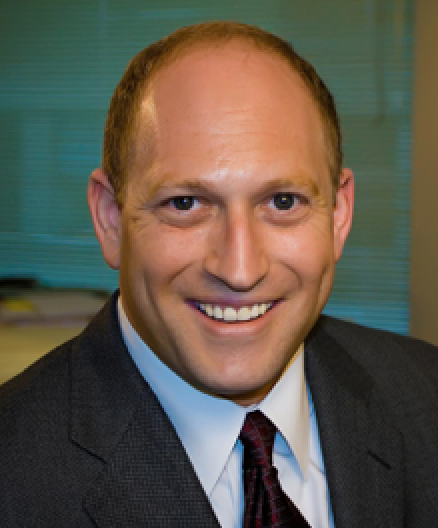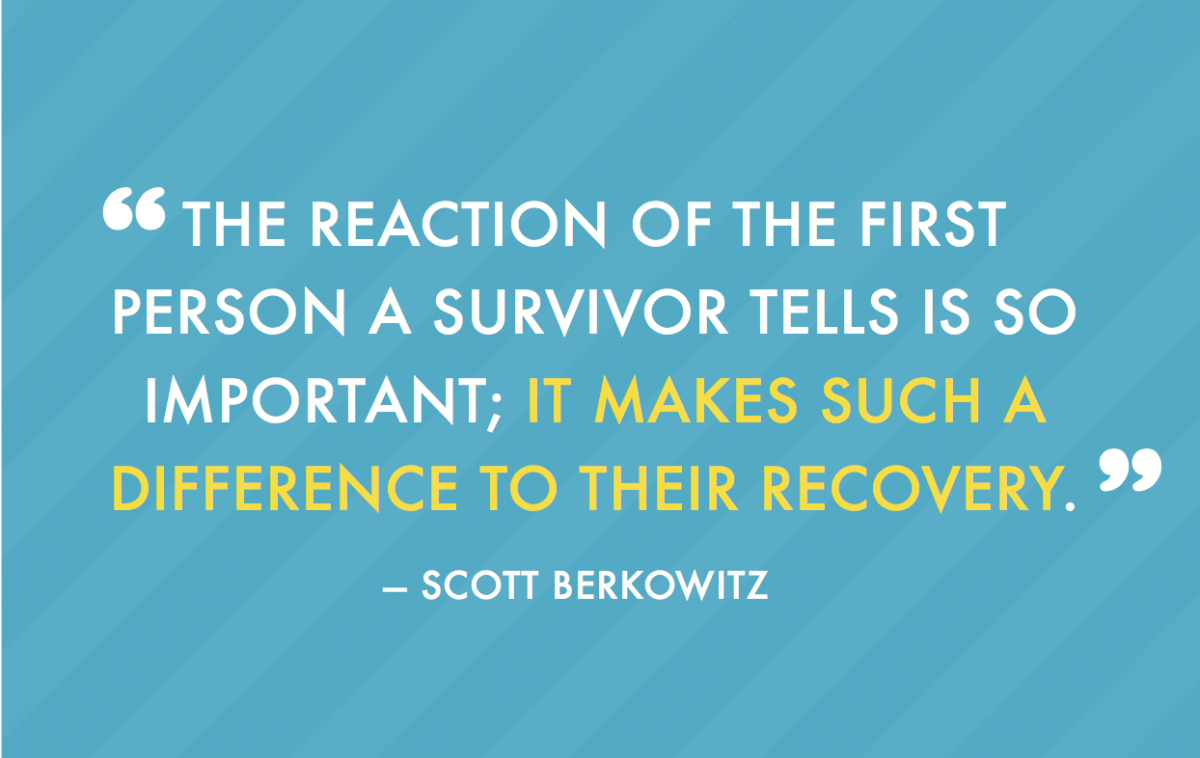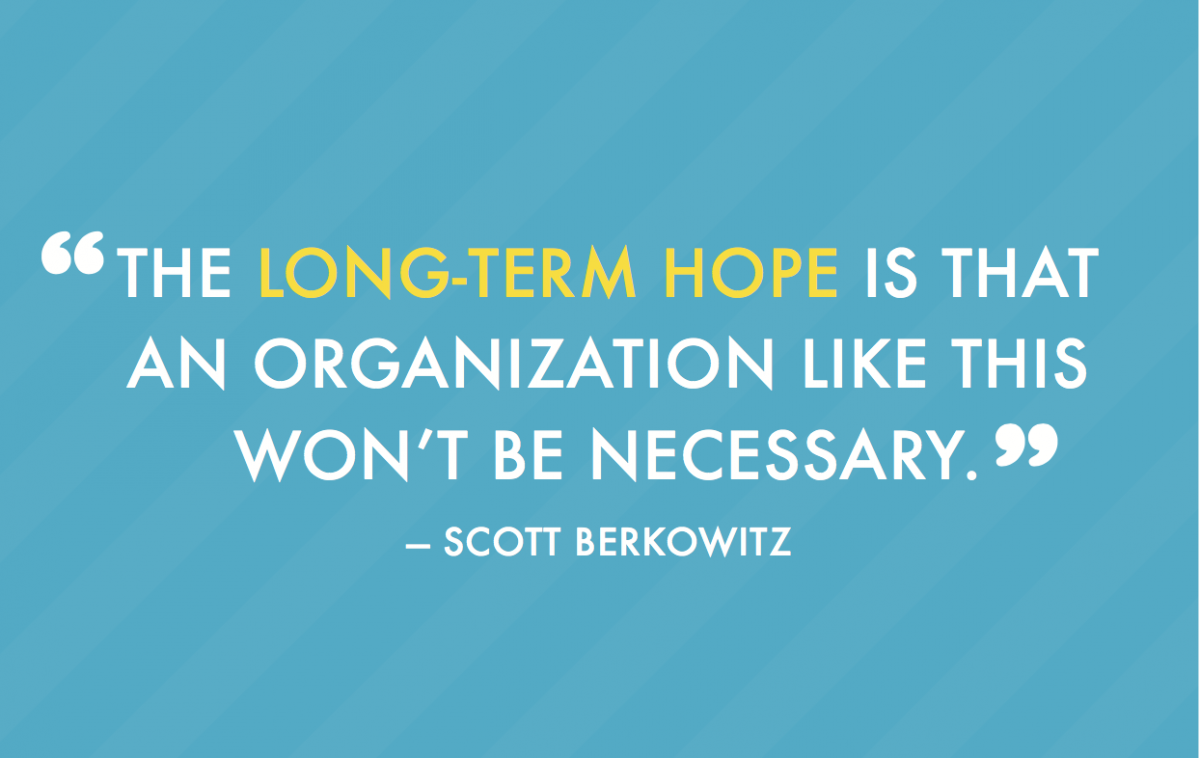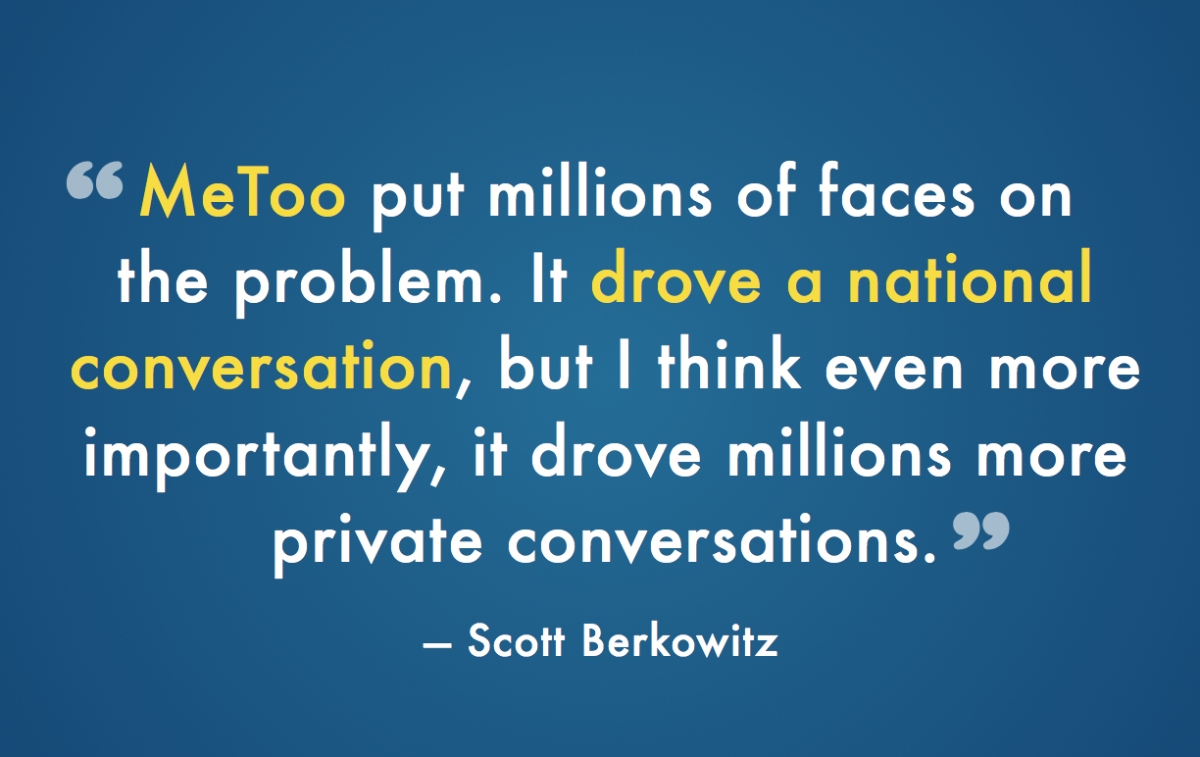When Scott Berkowitz founded RAINN in 1994, he had no idea it would grow into what it has become today—the largest anti-sexual violence organization in the United States. With the support of a community of people who believe that no one should have to experience sexual violence, it has grown to meet a national need.
We checked in with Scott to hear his thoughts on how RAINN has evolved, what it’s doing today to support survivors, and where he sees the organization going in the future.

Why did you found RAINN?
I had a friend who was working for a local service provider, and she would often talk about the big service gap that existed and how much we needed a national hotline. I knew next to nothing about the issue; it just seemed like a good idea. It was only once I got involved—started meeting survivors, working with volunteers, and learning about the extent of the problem—that I became passionate about trying to do something to fix it.
What were some early challenges or triumphs you experienced as RAINN grew?
Fundraising was definitely the biggest challenge in the beginning. It took a while to find the funding we needed—there were some rocky moments. There was also the challenge of building a national brand and ensuring that survivors and the public knew we were here. We were lucky in that regard. Two of our first donors were Atlantic Records and Warner Music Group. In addition to donating, they brought in many of their artists to do PSAs and talk about RAINN at concerts to help get the word out about what we were doing. They also helped with marketing and media outreach.
Who else has been influential to RAINN?
Tori Amos has been involved since the very beginning. She was our first spokesperson and has been on our National Leadership Council the whole time. To this day, I can’t tell you how many people I meet who say they first heard about RAINN from Tori. Her personal connection to the issue, and the passion she inspires, have really helped define the organization.
Our current board member, Katherine Miller, and board chair, Reagan Burke, have also been involved since the beginning and have done incredible work to shape what the organization is today. We also have donors who have been with us for more than 24 years now. Their loyalty has been incredible. Our board has always been supportive and has challenged us to grow and improve, from current board members like Tracy Sefl and Cybele Daley, to past members like Fred Arnold.
The hundreds of employees we have today, as well as many alumni, have helped us grow over the years. Thousands of volunteers help us educate communities and serve survivors. Our Government partners, like the Department of Defense and Department of Justice, have provided great support, as well as Corporate partners like Google. Members of Congress, like Sen. John Cornyn, Rep. Carolyn Maloney and many others, have made it their mission to help survivors and improve the criminal justice system. We couldn’t have done it without the more than 1,000 local sexual assault service providers who are our partners in the National Sexual Assault Hotline.
That’s just small sample of those who deserve credit. Over time, there have been tens of thousands of people who have had an influence on RAINN and have partnered with us to create a safer nation.
What was your vision for RAINN in 1994? Is it similar to the organization today?
It’s nothing like what I expected. The original mission was very narrow—it was just to run a telephone hotline, which at the time was considered high-tech. But over time a few things happened.
The demographics of this crime are very young; almost half of victims are under 18. Obviously the way people communicate has evolved a lot, and just having a phone hotline doesn’t work in this world anymore. That’s why we created our online hotline, which became the first crisis hotline on the web.
The other way things have evolved is we reimagined our mission and decided to expand it to include educating the public; improving public policy; and, most recently, consulting for companies and institutions in a granular way to improve how they handle sexual assault prevention and response.
One key aspect of the vision has never changed: find the very best people to work on the problem. Today, we’ve got hundreds of employees and thousands of volunteers, led by a really talented team of people leading each of our departments. They are responsible for our success, and for the fact that we’ve been able to help so many people.
How do you see RAINN evolving together with technology in the future?
Technology is a huge piece of everything we do. Our fastest growing service is our online hotline. We built the online hotline platform in-house, specifically with the needs of sexual assault survivors in mind so that we can guarantee their anonymity when they use our services. We’ve got a great team of software developers who are constantly updating the hotline with the latest technology and ensuring that it remains safe and secure.
In addition to that, last year we launched the HelpRoom, an online peer-support service that will soon be 24/7. We currently have a mobile app for the Department of Defense and are creating one for a more general audience that will be out later this year.
What has been surprising to you in your work at RAINN over the last 25 years?
That there’s almost universal support for what we’re trying to do. I know that goes against the conventional wisdom, but it has definitely been my experience. If someone hasn’t gotten involved before, it usually isn’t because they’re opposed to what we’re doing, it’s because no one’s ever asked. We’ve seen that a lot on Capitol Hill. Many members of Congress have thanked me for asking them for help because no one had ever asked them to work on an issue like this before.
The other surprising thing is just how wide an impact sexual violence has on our country. Perhaps most others already know that, but I didn’t until I got immersed in the issue, studied the data, and talked to lots of people who knew more about it than I did. This is truly an issue that affects nearly every family in America. Some consider it a women’s issue, but I don’t. Women are disproportionately at risk, but it also affects millions of men and kids. More so than many other crimes, it crosses race lines and income lines. If you don’t think anyone in your family has been affected, well, odds are that you’re wrong.

What advice would you give to those who care deeply about ending sexual violence, but aren’t sure how they can help?
The biggest, most important piece of prevention is family. It’s making sure that you educate your kids about the issue and teach them how to treat others. It’s something kids need to hear from their parents, religious institutions, teachers, and media. It needs to be a repeated message, over and over.
A few years back we did a project where we talked to survivors and asked them to recount what happened afterwards. Who was the first person they told? How did that conversation go? They recounted pretty consistent experiences of telling a parent or best friend, who then asked them lots of questions that made them feel like it was their fault, as if their own actions had led to the assault.
Then we interviewed the person they had disclosed to, the parent or best friend, and asked the same questions. Their memories of that first conversation were very similar, but it turned out that their meaning was quite the opposite of how it came across to the survivor. They said that someone they loved told them about this horrible event that had happened, and they didn’t know what to say or how to react. They were terrified of saying the wrong thing, of reacting in a way that would make things worse. So their solution was to stall for time by asking lots of questions until they could figure out how to be supportive and helpful.
They had no idea that those questions could come across as blame. They had no idea—and would have been devastated to find out—that their effort to be supportive actually made things worse.
The reaction of the first person a survivor tells is so important; it makes such a difference to their recovery. So just be aware that what you mean is not necessarily the way they’re going to hear it. If someone discloses an assault to you, they’re not looking for you to gather facts, they’re looking for your love and support.
In a way, do you hope that one day RAINN will go out of business—if it is successful in its mission to end sexual violence?
The long-term hope is that an organization like this won’t be necessary. That instead of figuring out how to grow our staff every year to meet growing demand, we can think about scaling back because the problem isn’t as big as it used to be. But there’s always going to be a need for prevention and public education. Every generation of kids needs to learn appropriate behavior. So that need is never going to go away, but hopefully the sheer number of people who need to reach out for help—about 270,000 last year and nearly three million since we started—will decline.

What have been the most galvanizing moments you’ve witnessed in the anti-sexual violence movement in the last 25 years?
It’s been very gradual, but there have been some moments in particular that have elevated the conversation and helped the country pay more attention to these issues. One is early in RAINN’s history when all of the national TV networks agreed to donate PSA time for the hotline. The fact that networks were willing to put messages about rape into prime time gave many survivors the confidence to start talking about what they experienced.
MeToo put millions of faces on the problem. It drove a national conversation, but I think even more importantly, it drove millions more private conversations. For the first time, people were telling their family, friends, or coworkers that they had experienced something terrible and that they weren’t ashamed for people to know.

Throughout 2019, you’ll be hearing more from RAINN about how we are marking 25 years of supporting survivors and working to end sexual violence. To help RAINN continue to do this work, please consider donating or volunteering.